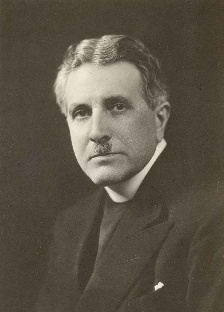Hough (1877-1971) was born in Cadiz, Ohio on September 10, 1877. He earned his A.B. from Scio College in 1898. In 1905 he earned his Bachelor of Divinity degree from Drew Theological Seminary. His first teaching position was at the Garrett Biblical Institute, which he left in 1919 to serve as President of Northwestern University. He was awarded the Th.D. degree from Drew in 1919. A year later he was invited to be a lecturer at Drew, but in 1928 he accepted a position to preach at The United Church of Canada. He returned to Drew in 1933 and was appointed professor of Homiletics and Comprehensive Scholarship. In 1934 he was appointed dean, earning the new title Professor of Homiletics and the Christian Criticism of Life in 1937.
Hough was the author of more than forty books, and the recipient of thirteen degrees, ten of which were honorary. He was one the most prominent Methodist ministers and writers during the first half of the twentieth century
and achieved this recognition through the eloquent and philosophical sermons he delivered across America. His sermons addressed issues of importance to the Methodist community, and included discussions on civil rights, evolution, and on American’s responsibility to Europe during and after World War II. In regards to his views on civil rights, Hough advocated equality for all law-abiding citizens, and publicly denunciated the Ku Klux Klan and all bigoted organizations at a sermon in 1923. Hough was praised for his preaching of tolerance and fair play. To some, his interpretation of evolution was deemed controversial, and charges of heresy were brought against him in response to his sermon, “Charles Darwin, Evolution and the Christian Religion” given in 1925. Hough advocated that the theory of evolution did not contradict the existence of God, but rather enhanced it. However, by publicly acknowledging the theory of evolution, he upset many clerics. Hough’s writings on America’s role during wartime included, "Nine Ways of Going Wrong" (1944) and "America in the World" (1947); these sermons stressed the importance of a morally upright America leading the world to peace.
Hough retired from active service to Drew in 1957, but continued to preach and write through 1959. Hough passed away in 1971 at the age of ninety-three, one year after his wife of thirty-four years, Blanche Horton.
Credits
Abbreviated from The Teachers of Drew, 1867-942, A Commemorative Volume issued on the occasion of the 75th Anniversary of the Founding of Drew Theological Seminary, October 15, 1942. Edited by James Richard Joy. (Drew University, Madison, N.J., 1942);
See also Lynn Harold Hough papers online, http://www.drew.edu/depts/library.aspx?id=13635.
Composed by Anthony D. Rogers, Courtesy of the Drew University Archives
